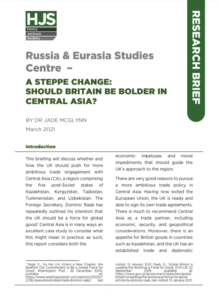Research Brief
‘A Steppe Change: Should Britain be Bolder in Central Asia?’
By Dr Jade McGlynn, Director of Research
March 2021
Introduction:
“This briefing will discuss whether and how the UK should push for more ambitious trade engagement with Central Asia (CA), a region comprising the five post-Soviet states of Kazakhstan, Kyrgyzstan, Tajikistan, Turkmenistan, and Uzbekistan. The Foreign Secretary, Dominic Raab has repeatedly outlined his intention that the UK should be a force for global good. Central Asia is in many ways an excellent case study to consider what this might mean in practice; as such, this report considers both the economic impetuses and moral impediments that should guide the UK’s approach to the region.
There are very good reasons to pursue a more ambitious trade policy in Central Asia. Having now exited the European Union, the UK is ready and able to sign its own trade agreements. There is much to recommend Central Asia as a trade partner, including economic, security, and geopolitical considerations. Moreover, there is an appetite for British goods in countries such as Kazakhstan, and the UK has an established trade and diplomatic presence in each of the five nations. Long seen as an authoritarian part of the world, in recent years there have been incipient signs of democratisation in CA’s two largest economies and nations: Uzbekistan and Kazakhstan.
However, while encouraging, these steps towards democratisation must be treated with considerable caution, as this report argues. While the Kazakh and Uzbek governments have evoked democratic values, they have not evidenced them. Moreover, the region’s most established democracy, Kyrgyzstan, is at risk of backsliding into the populist authoritarianism it overturned in 2010. The two remaining countries, Tajikistan and Turkmenistan, are decidedly not democracies. Thus, adopting an overly optimistic assessment of the region’s democratisation could embarrass the UK, undermine our efforts against authoritarianism in China, Russia and elsewhere, plus demoralise brave citizens in CA who need our support. The UK, especially the Department for International Trade, must therefore be guided by a cautious optimism in its dealings with the region, tempering trade aspirations with moral considerations and a commitment to championing democracy and human rights.”
About the Author:
Dr Jade McGlynn, Director of Research
 Dr Jade McGlynn is the Director of Research at the Henry Jackson Society, where she previously worked as a Research Fellow specialising in Russian political culture and foreign relations. Prior to joining HJS, Jade worked as a Lecturer and Researcher at the University of Oxford.
Dr Jade McGlynn is the Director of Research at the Henry Jackson Society, where she previously worked as a Research Fellow specialising in Russian political culture and foreign relations. Prior to joining HJS, Jade worked as a Lecturer and Researcher at the University of Oxford.
Jade holds a DPhil in Russian from the University of Oxford, where she also gained her BA in Russian and Spanish. She also has a Masters by Research in Russian and East European Studies from the University of Birmingham. Jade has published in various media outlets, leading academic journals, think tank reports, and collected volumes, and she is currently finalising a manuscript on the politics of memory in Putin’s Russia.
Outside of academia, Jade has worked in international marketing roles across Russia and Eastern Europe, managing teams across several time zones. She lived and worked in Russia for five years and has also worked and held research fellowships in Spain, Serbia, the USA, and Ukraine. As well as fluent Russian, Jade speaks Spanish, French, Serbian, and Ukrainian, with limited proficiency in German.



